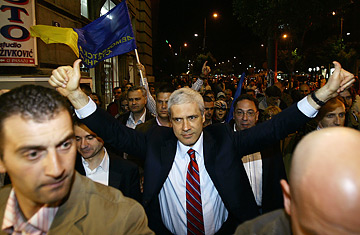
Serbia's pro-Western President Boris Tadic jubilates over his electoral victory.
The West was poised for bad news from the May 11 parliamentary vote in Serbia, where often shrill nationalist tones dominated the final days of the campaign. Instead it got good news: the pro-European Democratic Party emerged victorious, defeating the ultranationalist Serbian Radical Party and their allies. The Democrats, led by President Boris Tadic, won some 37% of the vote, or 103 out of 250 seats, which should enable Tadic to dominate Serbia's policies for the next several years. The Radicals came a distant second, with 77 seats, which works out at 29.1% while the Democratic Party of Serbia, led by outgoing Prime Minister Vojislav Kostunica, won just 30 seats or 11% of the vote. Over the past year, the formerly moderate Kostunica evolved into a staunch nationalist, and he had hoped to form a government with the Radicals.
The outcome came as a surprise. Most pollsters and political analysts predicted the defeat of the Democrats, who came under heavy fire after the formerly Serb province of Kosovo declared independence on February 17 and was recognized by most E.U. countries. During the campaign, Kostunica and the Radicals portrayed the E.U. as an evil empire bent on stealing a part of Serbia, while Tadic was labeled as traitor who was ready to sacrifice Kosovo for a distant promise of E.U. membership. The Radicals, whose chairman Vojislav Seselj is on trial for war crimes at the International Criminal Tribunal for the former Yugoslavia in The Hague, even threatened to impeach Tadic immediately after the elections and try him for high treason. They also vowed to root out other pro-European "traitors" from political scene and form a strong bond with Russia, which might have turned Serbia into a Balkan version of Belarus.
But most Serbian voters rejected the siren call of nationalism, despite their general frustration over the loss of Kosovo and despite Russia's open support for the nationalists. The negative campaigning by Kostunica and Seselj's deputy, Tomislav Nikolic, appeared to have backfired, triggering another victory for Tadic, who only narrowly defeated Nikolic at the presidential polls earlier this year. The E.U. also helped Tadic by signing a Stabilization and Association Agreement — a first step toward membership — with Serbia in late April and relaxing visa requirements, which effectively prevented ordinary Serbs from traveling to the West.
However, Tadic's victory is not complete. Since he can't form a government on his own, he will need to find a coalition partner. Paradoxically, the most likely candidate is the Socialist Party of Serbia, whose founder was Slobodan Milosevic, the darkest figure in Serbia's recent history. The Socialists won 20 seats in the parliament, which, along with ethnic minorities who have 10 seats, should be enough for Tadic to build a comfortable majority.
A governing alliance between the Democrats and the Socialists will be uneasy, but far from impossible. Under Ivica Dacic, a youngish leader who took over the party after Milosevic's death in 2004, the Socialists have discarded much of their nationalist ideology and focused on social issues, which explains their relative success in Serbia. Neglecting the country's pauperized working class, which faced massive job losses and severe cuts in social benefits during Serbia's bumpy road to capitalism, was one of key mistakes of Serbia's pro-Western politicians after Milosevic's fall. With the Socialists in the government, this can now be corrected.
However, this is not the only fix that Serbia now needs; too many ghosts from the past still haunt the country. Fugitive General Ratko Mladic, indicted for the genocide of Bosnian Muslims in Srebrenica, needs to be apprehended and delivered to The Hague. In order to achieve this, Serbia's security sector — the police, intelligence agencies, and the military — needs to be drastically purged of the old cadre and reformed. And the economy, still largely controlled by the state, needs to be allowed to develop unhindered by the government's heavy hand.
Finally, Serbs will have to find a way to live with the fact that Kosovo will never be a part of their country again. It's unrealistic to expect that the new government would recognize Kosovo's independence in the foreseeable future, but some sort of peaceful coexistence has to be found.
These tasks are not easy, but at least they're feasible now that the nationalists are no longer breathing down Tadic's neck.
